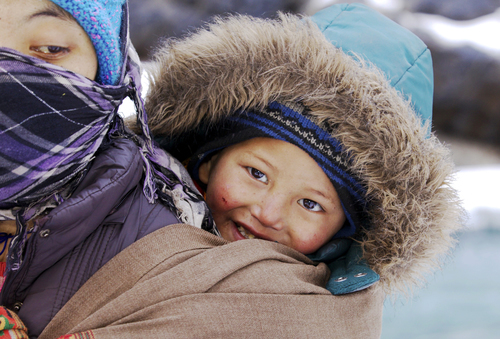In Little Seeds Program:

Little Seeds House
World's Most Dangerous Walk to School
The Chadar is the name of the ice river which threads through the frozen valleys of Zanskar. Due to the extreme geographic isolation, the ice river is the only means of access in and out of the region during winter.
For 6-8 months each year, Zanskar is cut off from the rest of the world by snow which blocks the roads and high passes. Villagers must wait until the depths of winter when the Indus river has frozen over before they can be linked again to the outside world.
For the last 10 years, Lille Fro has supported children from Zanskar in their education in Leh. Desperate to go to school, these children brave sub-zero temperatures and risk their lives each year to take what has been coined, ‘The World’s Toughest Walk to School”. A gruelling walk along the treacherous ice river which is the only means of getting to school when it resumes after the winter break in March.
The journey is fraught with danger especially for the little ones, some only 4 years old. With the ice changing every hour, one ill-timed step can mean death. This is the World's Toughest Walk to School.
Project Outline
Little Seeds House is a community hostel project undertaken by the Lille Fro India Trust in partnership with Lille Fro Foundation Australia (together called ‘Lille Fro’) to provide universal access to schooling for disadvantaged children from the remotest parts of Zanskar in the Indian Himalayas.
The new hostel will provide disability-inclusive accommodation and boarding facilities for between 64 - 80 children who satisfy Lille Fro's Little Seeds Program eligibility requirements.
In an environment where geography, climate and poverty are the biggest obstacles to children from remote areas receiving a basic quality education, the Program’s aim is to level the playing field by removing the barriers of entry into the education system for marginalised indigenous children in Ladakh.
In particular:
- indigenous children from low-income families (ie: living in extreme poverty as defined by the World Bank or where earning potential is hindered due to sickness, disability etc);
- disadvantaged and vulnerable children (ie: children who are disabled, orphaned, working as child labourers, subject to domestic violence or abuse etc);
- indigenous children from remote villages where there is no functioning school.
Lille Fro's community hostel in Zanskar is first project of its kind in the region and addresses an urgent need. In the mountain villages of Zanskar, where local village schools rarely function and there is a lack of residential accommodation in the valley, many parents are too poor to send their kids to boarding school. The reality is that children from low-income families often miss out.
In support of Lille Fro’s Little Seeds House project, the Kargil Autonomous Development Council in the State of Jammu and Kashmir, has granted a long-term lease of land to the Lille Fro India Trust for this purpose.
Situated at an altitude of 3,600 metres, Little Seeds House will be located 2km of the regional capital Padum in the Zanskar Valley. The site is within proximity to healthcare services and a local public and private schools network which these children would otherwise not be able to access. It will also mean that these children no longer have to risk their lives just to receive an education.
The Lille Fro India trust will enter into MOUs with implementation partners on the ground including a reputable and experience management entity and to document the ongoing management and running of the hostel.
Design Brief
Lille Fro's vision is to create a 'home away from home' for children and staff providing a warm and safe environment in which the children can be nurtured and thrive.
As first time learners in their families, many of these children, some as young as five, have never left home before. As such, Lille Fro’s brief was to create an inclusive environment and sense of belonging which mirrors a traditional Ladakhi home and community life, in so much as is possible.
Integral to the design strategy is the need to counteract the harsh climate high-altitude desert environment. Incorporated into the architectural design are innovative measures to reduce impact from wind and dust as well as to maximise sunlight during the long winter months where temperatures drop to -30 degrees for 8-10 months every year.
Considered landscaping will also maximise use of outdoor areas providing adequate shade and distinct areas for play, interaction and contemplation during summer months.
Little Seeds House is designed so children can flow seamlessly between these scaled environments (both indoors and out) which cater for the individual’s needs regardless of age.
Please make a donation and help us achieve our funding milestones.
READ MORE ABOUT THE ICE RIVER. FOLLOW THE JOURNEY.
